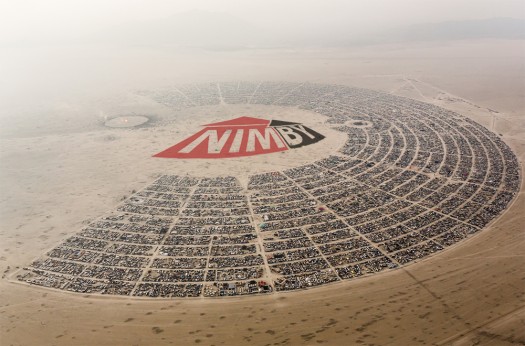A Placemaking Journal
There Goes the Neighborhood: Oh no, not Burning Man!
 Reprising: “Can’t we all just get along?”
Reprising: “Can’t we all just get along?”
Answer: Probably not. And we should be thinking about why and how that informs what we do to help neighborhoods and cities adapt to change.
Let’s pick an example unlikely to trigger the usual arguments over race, ethnicity and inequality, yet one that might be more helpful because of the absence of those factors. I give you Burning Man, the annual event in the Nevada desert where some 70,000 folks gather to test the limits of art, collaborative culture and diversity. On that last count, the one about tolerance for differences, a line was apparently crossed a few weeks back when one set of Burners decided others didn’t belong in the neighborhood.
“It is supposed to be a utopian vision of peace and love,” writes Nick Allen of the The Telegraph, “but this year’s Burning Man Festival has been marred by ‘hooligans’ carrying out a ‘revolution against rich parasites.’”
The alleged perps were annoyed by what seemed to them to be a violation of Burning Man principles of openness and inclusion. (Let’s call the activists defenders of heritage and community character.) So they (allegedly) invaded the encampments of other folks who looked to be overly entitled types flaunting their wealth and privilege. (Let’s call them gentrifiers.)
Bad vibes ensued.
A quote from an allegedly wronged party in Allen’s story:
“A band of hooligans raided our camp, stole from us, pulled and sliced all of our electrical lines leaving us with no refrigeration and wasting our food, and glued our trailer doors shut.
“They vandalized most of our camping infrastructure and dumped 200 gallons of potable water flooding our camp.”
Peruse the photos in Allen’s piece or any other shots or tweets related to Burning Man, and you’ll have a tough time ramping up concern for those who have the time and resources to trek into the desert for a week or so each year to play with super cool pyrotechnics and celebrate the overall awesomeness of their tribe. But stifle the snark. This is a learning moment.
In the toxic environment of the current national political campaigns, we’re starting to slowly unpack the components of polarization. Many of us seem ready to acknowledge how histories of exploitation and abuse of some populations, plus an atmosphere of economic uncertainty, are fueling mistrust and resentment. We’re fine-tuning our capacities for empathy. Which is great. But recognizing some people are really pissed off for some really good reasons doesn’t seem to help us make better decisions, whether we’re talking about electing a president or planning a park.
Wouldn’t it be great if we could start all over with a fresh slate, with no shared histories of injustice and inequality? What if we shared instead a commitment to community designed to avoid all the missteps that led to one group lording it over another group, that stifled creativity and collaboration? Well, I give you, once again, Burning Man.
Its founders and legions of enthusiasts have pledged themselves to 10 principles. Among them: “Radical Inclusion.” They head out into the Nevada desert every year and build what amounts to a city, complete with thoroughfares, electrification and waste management systems. Then they tear it all down and leave the desert “without a trace” of having been there. The remoteness and temporariness of their encampment exempts them from lots of stuff that pesters more permanent places and frees them to focus on entertaining themselves for a week. For that time, they are a glorious community united mostly by a shared attitude.
Until, that is, someone displays an unacceptable attitude.
The Burners seem to enjoy unique advantages in having to maintain a community for only a week and in sorting out all the folks who don’t have the interest or the resources to join in. They’re already of similar mind in many ways. If they develop a NIMBY problem, what does this say about the challenges of overcoming resentment where we all live and work?
First of all, it tells us that recognizing legitimate beefs among those determined to disrupt or opt out of public processes in our communities may be necessary. But it doesn’t explain enough of what’s really going on to help us move forward. It turns out — as the Burning Man example suggests — that resenting others comes more naturally to us than we like to admit.
Zack Beauchamp, in a September 19 post on Vox, surveys a ton of research on the primary motivations of far-right voters and activists now and in the past, in this country and world-wide. Much of that research, Beauchamp argues, fails to support notions that economic anxiety has been a principal driver of anger and resentment on the right. Rather, it’s a more primitive antagonism for the Other, for those individuals and groups perceived to be threats to the cultural and political control of a dominant group — or a group that perceives itself as dominant and having rights to assert and defend cultural norms.
“In short: There was no good evidence that economic anxiety was driving cultural resentment,” writes Beauchamp. “Economics played some contributing role, but it seems much more likely that the far-right backlash is about what the far-rightists say it’s about: immigration, race, and culture.”
None of this should give comfort to those on the left who are themselves deeply offended by the deeply offended right wing. Both are alarmed to find their tribe is not in charge of what’s normal and what’s not. The Burners who invaded their neighbors weren’t acting out of racist motivations. They were in revolt against presumed privilege and exclusivity, the Other of wealth. Which is just another kind of resentment that mucks up the machinery of civic life.
Those of us with left-of-center leanings, tend to nod our heads at the exposure of the under-educated right’s self-destructive resentment. Yet we’re perplexed when the over-educated activists in a neighborhood association wave the “community character” flag to prevent people other than those like them from sharing their neighborhood.
We’d better get better at dealing with this before the hooligans unplug all the espresso machines.
–Ben Brown
If PlaceShakers is our soapbox, our Facebook page is where we step down, grab a drink and enjoy a little conversation. Looking for a heads-up on the latest community-building news and perspective from around the web? Click through and “Like” us and we’ll keep you in the loop.







